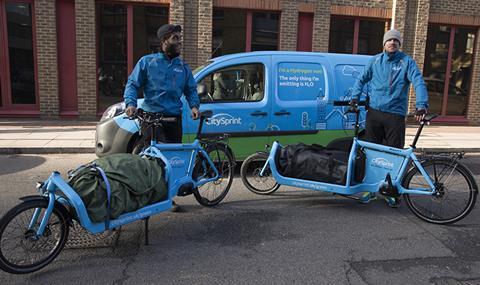
In its 2020 progress report to the UK government on cutting carbon emissions, ‘Reducing UK emissions - progress report to Parliament’, the Committee on Climate Change has called on ministers to “seize the opportunity” to turn Covid-19 into a “defining moment in the fight against climate change”.
The report recommends urgent measures to be taken by next year to help the road freight industry achieve net-zero emissions by 2050, including setting out and implementing “a strategy to transition to zero-carbon freight, including stronger purchase incentives, infrastructure plans and clean air zones”.
Despite a plethora of recent trials and pilot schemes the committee also wants to see more evaluation of opportunities to reduce HGV and van use in urban areas through the use of ecargo bikes and urban consolidation centres. It also wants more trials of zero-emission HGVs to “establish which is the most suitable and cost-effective technology” for the UK.
The committee also wants the government to “strengthen incentives to buy more efficient and zero-carbon HGVs”, include HGV recharging in Project Rapid plans and bring forward the phase out of internal combustion engined cars and vans from 2035 to 2032.
RHA chief executive Richard Burnett said: “Today’s report from the Committee on Climate Change features laudable aims to address our environmental challenges. These must now be set within a sustainable strategy which recognises that environmental and social well-being depends on economic well-being – and must ensure that road space and infrastructure works for all.
“Hauliers drive economic well-being and are essential for supplying local high streets and businesses with the goods we all need.
“With the UK economy forecast to experience its worst recession in living memory, piling 'green' costs on to businesses who are on their knees is imperceptive and ill-conceived.
“The government must forge a strategy with clear standards in place that allow businesses to invest with confidence in the technology needed to decarbonise.”
The Low Carbon Vehicle Parntership (LowCVP) also welcomed the report, especially "the call for greater ambition in terms of road transport decarbonisation" and said the LowCVP is currently preparing its own response to the combustion engine phase-out consultation which runs until the end of July.
"It’s not just a matter of ambition, however; we need practical, deliverable policy proposals to support the phase-out and the longer-term transition to net-zero," said a spokesperson.
The LowCVP is holding a virtual conference on July 15 to propose and discuss various policy prescriptions and it has put out a call to stakeholders to respond to a survey which will inform the conference discussions and help to frame the debate.













